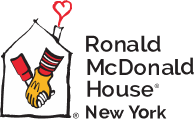Research indicates that 80% of factors impacting health are non- clinical. Services addressing the social determinants of health such as education, housing, transportation, food and recreation not only improve health outcomes but help contain costs. At Ronald McDonald House New York (RMH-NY), we operate at the nexus of healthcare and hospitality, providing clients direct access to affordable accommodation, food, transportation, tutoring, and an array of recreational and wellness services.

Although including families as critical members of a child’s care team is now a standard in pediatric care, the practice is still not widely adopted in clinical settings, nor has its efficacy been adequately measured and documented. According to an issue brief released by the Lucile Packard Foundation for Children’s Health, as the primary caregivers of their critically ill children, families experience fragmented care and other barriers as a result of health policies and practices that do not take their care-giving role into account. “Families’ lived experiences make them uniquely qualified to partner in shaping systems level policies that can improve systems of care for all children,” write the brief’s co-authors Clarissa Hoover, MPH, Mary Jo Paladino, MSA, Beth Dworetzky, MS, and Nora Wells, MSEd.
A guiding principle of RMH-NY’s family-centric approach is to facilitate “kids being kids.” Our model depends on the family to family, caregiver to caregiver, child to child connections not possible within a clinical setting—a family centric approach that unifies the Ronald McDonald Houses all over the country. When New York became the epicenter of the pandemic, our services, so deeply anchored in supportive human presence, needed a different means of distribution, and quickly.

During quarantine, immune-compromised children and their families were relegated to their rooms. We had to suspend the communal meals so central to our seamless circle of support for families. Service delivery in the House foundered: staff could not get to work, could not safely collaborate in person, or they experienced their own health crisis, their own burnout. Even satellite services delivered through family rooms and hospitality carts within hospitals had to suspend support due to protocols about social distancing.
The pandemic pivot to virtual health care presented RMH-NY a means to deepen its scope and extend its reach by providing services remotely. We learned that we could support a far wider range of families in dealing with a more diverse array of serious illnesses. The digital transformation called for in our 2020 strategic plan and accelerated by the pandemic has implications for operations and fundraising as well as service provision. These practical adjustments allowed us to continue to bring joy into peoples’ lives in the most difficult times. Lessons learned during the pandemic continue to inform the organization’s operations and strategic direction while further developing our role in healthcare policy and advocacy.

Cancer survival rates overall have improved significantly in the United States for the past five decades. Forty years ago, when Ronald McDonald House-New York’s (RMH-NY) started out, only 15% of children using our services survived. Today 80% of children using our services now survive.

Although overall survival rates have improved, however, disparate outcomes among children and adolescents with cancer still affect many populations in the United States and globally, including racial and ethnic minorities, populations with low socioeconomic status, and residents of underserved areas.
In working with our 18 hospital partners, our role in the New York City continuum of health care has deepened. By blending this remote access to services into our operations and deepening our engagement with New York City’s CBOs and “safety net” public hospitals, we are incubating a replicable model of family-centric, culturally competent care that can inform health policy, and help address the entrenched disparities that have diminished only slightly in the five decades that the Healthy People USA initiative has collected data.
Patient satisfaction increases within our model even as families navigate life-threatening illnesses. Over the last 40 years, we’ve learned that when services are tailored to families’ articulated needs not only does satisfaction improve, so do health outcomes. The impact of these services on health outcomes has increasingly deepened our connections with our 18 hospital partners whose mandates require improving outcomes while containing costs.

Models of service delivery and methods of measuring impact can help build equity into children’s health, as will cross-sectoral partnerships. Before the pandemic, our corps of 8000 volunteers drew from all sectors, including the entertainment industry, corporations and community-based organizations providing aligned services. In building back a post-pandemic volunteer corps and model of care, we re-commit to the principles of family engagement, drawing on industry leaders, other nonprofits and government representatives to design, implement and evaluate expanded services, in-person and remotely.

RMH-NY time-tested approach to addressing social determinants of health through family-centric, culturally competent care is being expanded. Extended services and our deepening role in healthcare and hospitality policy and practice can help address the needs of families seeking treatment for a range of serious pediatric illnesses. Additionally, the pandemic demonstrated that the model can now operate within an expanded geographic range targeting families within the five boroughs of NY. Increasingly we enlist local CBOs to partner with RMH-NY to serve their mission, while helping us provide services more cost- effectively. Opportunity is often embedded in crisis, offering RMH-NY new partnerships, new perspectives providing deeper analysis of root causes, and a clearer path to more equitable and effective healthcare.







